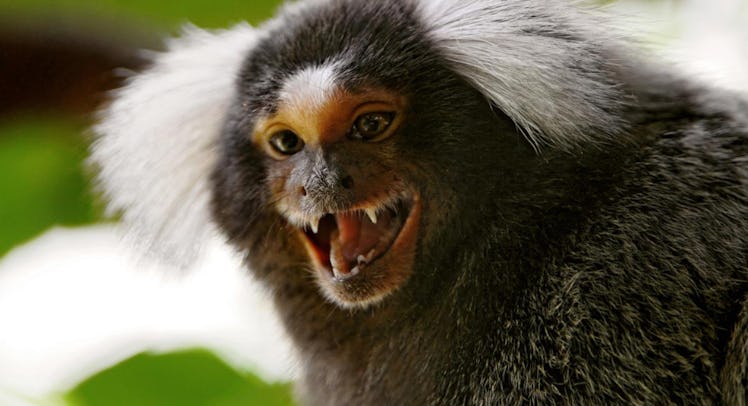Meet The Wokest Dad in the Animal Kingdom
They're faithful and buck traditional parenting roles.

The internet loves an adorable father-child animal parenting moment, but there’s a reason why they’re few and far between: the wild world is filled with terrible fathers. Grizzly bears, for example, eat cubs that wander too far into their territory; giraffe fathers aren’t allowed at births because they get too violent. And don’t get us started on the assassin bug or bass. Point is, good animal fathers are hard to find.
But like such woke-ass dads as the seahorse and penguin, some animal fathers refuse to give into these stereotypes and prove to be exceptional dads. One such animal? The marmoset, who may be one of the most attentive and caring fathers in all the animal kingdom.
Marmosets are a species of 22 different tree-dwelling monkeys found commonly in South America and Mexico. They’re roughly the size of squirrels and identified by a white tuft of hair that covers their ears. Living in the upper canopy of trees, they feast on bugs but really have a sweet tooth for tree sap. They’re by all accounts pretty hunky, and, when single, chase and get a lot of tail. But once a mate becomes pregnant, the Doc Brown-looking creature gives up his philandering ways and settles down to be a damn fine pater familius.
Unlike humans, having a kid has almost no effect on the testosterone levels of most animal fathers — including primates. When a male tiger dad smells the pheromones a lady tiger, his testosterone levels rise the same way they did before he became a dad. This makes sense for the continuation of the species. But it does not make for a good father. Marmosets, however, buck the trend. In 2005, a team from the University of Wisconsin-Madison exposed male marmosets to the scent of ovulating females. Non-fathers went wild over the scent; marmoset dads, however, weren’t fazed.
This was a big surprise to Toni Ziegler, an endocrinologist and the lead author on the study, who assumed the reverse would occur since “marmosets like sex.” Senior author and chair of the psychology department at University of Wisconsin-Madison Charles Snowdon shared Ziegler’s sentiment.
“It is a common notion that males are always interested in sex, regardless of their social status. But this study counters what has been seen in all other primates,” he said. In other words, marmoset papas aren’t going to ditch their pregnant wives for some notches on their tree-posts.
But their modern dadness doesn’t stop there. Marmoset dads act as midwives during birth — growing the newborn and licking it clean. And because a marmoset moms birth two sets of twins every year that make up 25 percent of her body weight, dad is very involved in carrying, feeding, and grooming his family. They even gain some sympathy weight: In a 2009 study, male marmosets were showed “weight gain during their mate’s pregnancy.”
So here’s to the marmoset. In a world filled with less than stellar animal fathers driven by sex and dominance, the marmoset rises above the mediocrity and happily plays the part of devoted husband and responsible father.
This article was originally published on